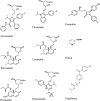Lipid-lowering agents that cause drug-induced hepatotoxicity
- PMID: 17723922
- PMCID: PMC2048990
- DOI: 10.1016/j.cld.2007.06.010
Lipid-lowering agents that cause drug-induced hepatotoxicity
Abstract
The effort to reduce cardiovascular risk factors, including hyperlipidemia, has led to the increased use of lipid-lowering agents. Hyperlipidemic patients often have underlying fatty liver disease, however, and thus may have elevated and fluctuating liver biochemistries. Therefore, caution should be applied before attributing elevated liver tests to lipid-lowering agents. Data indicate that patients who have chronic liver disease and compensated cirrhosis should not be precluded from receiving statins to treat hyperlipidemia. Several recent studies and expert opinion currently fully endorse statin use in patients who have nonalcoholic fatty liver disease and other chronic liver disease if clinically indicated.
Figures
References
-
- American Heart Association. Cardiovascular disease statistics. 2006. [Accessed January 1, 2007]. Available at: http://www.americanheart.org/presenter.jhtml?identifier=4478.
-
- British Heart Foundation statistics website. CVD mortality in Europe. Mar 312005. [Accessed January 1, 2007]. Available at: http://www.heartstats.org/topic.asp?id=753.
-
- Grundy SM, Cleeman JI, Merz CN, Brewer HB, Jr, Clark LT, Hunninghake DB, et al. Coordinating Committee of the National Cholesterol Education Program. Implications of recent clinical trials for the National Cholesterol Education Program Adult Treatment Panel III Guidelines. Journal of the American College of Cardiology. 2004;44(3):720–32. - PubMed
-
- Parra JL, Reddy KR. Hepatotoxicity of hypolipidemic drugs. Clinics in Liver Disease. 2003;7(2):415–33. - PubMed
-
- Chitturi S, George J. Hepatotoxicity of commonly used drugs: nonsteroidal anti-inflammatory drugs, antihypertensives, antidiabetic agents, anticonvulsants, lipidlowering agents, psychotropic drugs. Seminars in Liver Disease. 2002;22(2):169–83. - PubMed
Publication types
MeSH terms
Substances
Grants and funding
LinkOut - more resources
Full Text Sources
Medical


